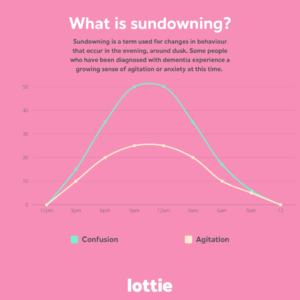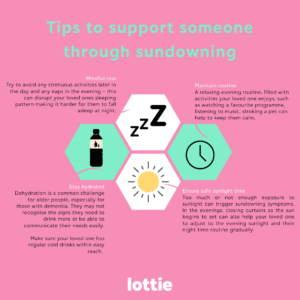How heat affects sundowning in dementia

Temperatures in the UK have reached record-breaking highs this summer. The heatwave poses a risk to everyone’s health, especially those living with dementia, as they are at greater risk of dehydration, tiredness and behavioural changes – including ‘sundowning’.
What is sundowning?
‘Sundowning is a state of confusion many of those living with dementia experience in the late afternoon or early evening and can cause changes to their behaviour and mood’, says care expert and co-founder of Lottie, Will Donnelly. One in five people living with dementia experience sundowning symptoms and the heat can heighten behavioural sundowning episodes.
Research by by Lottie has revealed that in the seven days that the UK was expecting and experiencing significantly higher temperatures than the norm, there was a surge of online searches on Google, looking for information on ‘sundowning’ and ‘dementia’:
- 100% increase in searches for ‘sundowning behaviour’
- 50% increase in searches for ‘sundowning dementia patients’
- 22% increase in searches for ‘sundown dementia symptoms’
In the peak of the summer, the longer days of sunlight can leave those experiencing sundowning symptoms confused for longer as their internal body clock adjusts to a new routine. Combined with exhaustion from the heat, sundowning episodes can be exacerbated.

Why does sundowning happen?
Whilst the main cause of sundowning is unclear, there are lots of factors that can trigger a sundowning episode, including unmet needs that aren’t being communicated, such as tiredness, hunger, and thirst, and disturbance to a daily routine. Sometimes what seems like ‘sundowning’ could be the person trying to communicate a need.
‘As the temperatures in the UK continue to rise it’s really important to recognise the signs and symptoms of sundowning to keep those living with dementia safe and well’, advises Will Donnelly.
How can we help?

Communication. Good communication can make it easier to meet your loved one’s needs and reduce sundowning symptoms. You can work together to find a communication style that help you both to understand each other. There are communication resources available online to support you with this.
Hydration. Dehydration is a common challenge for older people, especially for those with dementia. They may not recognise the signs they need to drink more or be able to communicate their needs easily. You can make sure there are regular cold drinks within easy reach. For instance, place a jug of fresh, cold water in every room and in their usual places, including next to their favourite chair. Lots of fruit and vegetables are also great sources of water. Cucumber, tomatoes, melon and oranges are full of water, and make the perfect snack. You could make a lovely, fresh fruit salad for you both to share.
Rest. The heat can increase exhaustion and fatigue, so it’s worth making sure your loved one is getting plenty of rest during the summer months. Try to avoid any strenuous activities later in the day and any naps in the evening as this can disrupt sleeping patterns, making it harder to fall asleep at night.
Routine. A daily structure can help to decrease any behaviours such as aggression, restlessness or confusion which many people living with dementia experience in unfamiliar situations. A relaxing evening routine, filled with activities your loved one enjoys, such as watching a favourite programme, listening to music, and stroking a pet can help to keep them calm.
Safe sunlight. Too much or not enough exposure to sunlight can trigger sundowning symptoms. It is good to enjoy some sunlight during the cooler hours of the day (early morning or evening) and stay out of the sun. In the evenings, closing curtains as the sun begins to set can also help your loved one to adjust to the evening sunlight and their night-time routine gradually.
Photo by Pixabay https://www.pexels.com/photo/abstract-beach-bright-clouds-301599/
If you found this article useful, you may like to read:
- Can we help those with dementia to sleep through the night?
- Tips on making life easier for someone living with dementia
- Maintaining a relationship when your parent has dementia

